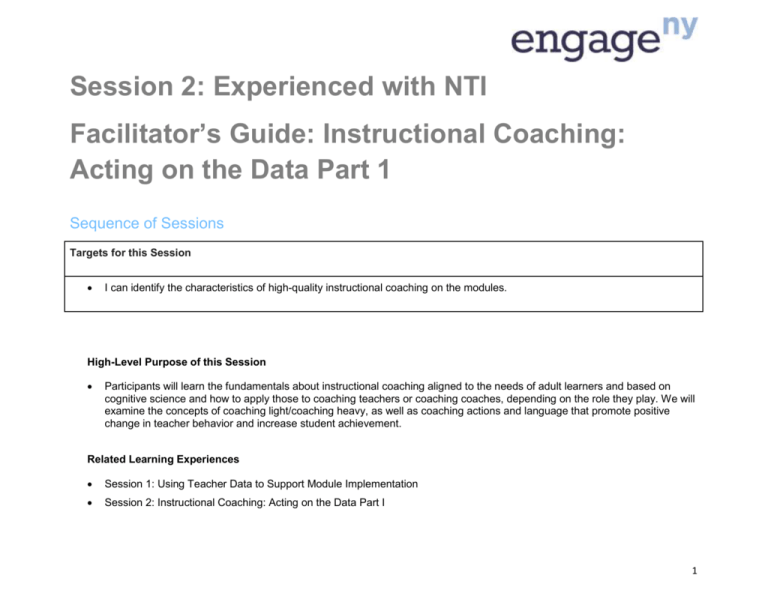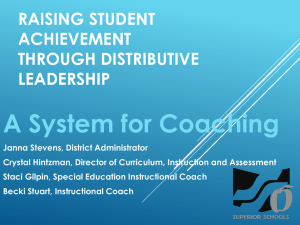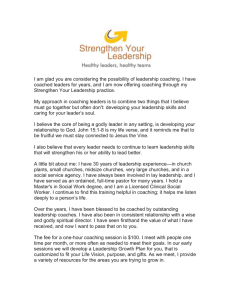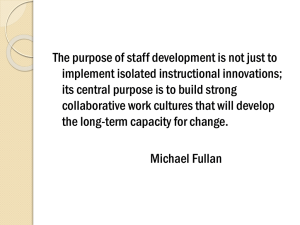Instructional Coaching Acting on the Data: Part 1
advertisement

Session 2: Experienced with NTI Facilitator’s Guide: Instructional Coaching: Acting on the Data Part 1 Sequence of Sessions Targets for this Session I can identify the characteristics of high-quality instructional coaching on the modules. High-Level Purpose of this Session Participants will learn the fundamentals about instructional coaching aligned to the needs of adult learners and based on cognitive science and how to apply those to coaching teachers or coaching coaches, depending on the role they play. We will examine the concepts of coaching light/coaching heavy, as well as coaching actions and language that promote positive change in teacher behavior and increase student achievement. Related Learning Experiences Session 1: Using Teacher Data to Support Module Implementation Session 2: Instructional Coaching: Acting on the Data Part I 1 Session 3: Instructional Coaching: Acting on the Data Part II Key Points All principals are instructional coaches, they just might coach the coaches versus coach the teachers. In that case, principals need to ensure coaches are effective. Understanding cognitive science can lead and influence mindful change–organizational transformation that takes into account the physiological nature of the brain, and the ways in which it predisposes people to resist some forms of leadership and accept others. Leaders need to create “moments of insight” for teachers through their coaching–they should keep this phrase in mind throughout the remaining sessions Session Outcomes What do we want participants to be able to do as a result of this session? Participants will be able to identify the characteristics of highquality instructional coaching on the modules. How will we know that they are able to do this? Engagement in protocols and application in the next session. Session Overview Section Time Overview Prepared Resources Facilitator’s Preparation The Science of Change 20 Introduction to change that is mindful of physiological processes and “moments of PPT_2P_IC Act on Data_714 Work through activities as a learner prior to facilitation. Participant notebook 2 insight” leaders help to create Video: Principal and Coach Collaboration Application to our Coaching 40 Download videos to a jumpdrive. Explore their own identify PPT_2P_IC Act on Data_714 regarding coaching heavy/light Participant notebook and learner/judger mindset. Session Roadmap Section 1: The Science Change Time 11:2511:32 7 min Slide #/Pic of Slide 1,2,3 Time: 20 Script/Activity directions Introduce the session topic and targets. Clarify that even if principals do not coach teachers directly, they need to know quality instructional coaching so they can support their coaches in doing so. Conduct a poll o How many principals are the main instructional coach at their school? o How many do some coaching? o How many have coaches who do all of the coaching? All principals are instructional coaches–just might coach the coaches versus coach the teachers–in that case–how do Grouping 3 you know your coaches are effective? Principal and Coach Collaboration - (only show 1st 3:30) Michael is the Principal of a High School designed primarily to serve the economically disadvantaged in the city of Denver. Brooke serves as the Instructional Coach and supports teachers across grades 9-12 and in all subject areas. Michael and Brooke regularly collaborate around professional development systems and structures that support teaching and learning across the school. Today they are reviewing teacher feedback in order to plan future professional development. While viewing, note the role of the principal, and the role of the coach. What are your observations and questions? The teacher feedback they are reviewing is similar to the teacher data that participants analyzed in session 1. This video illustrates one more way to collaborate with other instructional leaders to be facilitators of change. No one can do this alone. 11:3211:42 10 min 4,5,6,7 Make the connection to the previous session that the Concerns Based Adoption Model tell us the “what” people need (they need more information, or to collaborate, or to refine their practice), but cognitive science teaches us “how” to deliver it in a way that leads to actual changes in behaviors. Participants read Rewiring the Adult Brain. (3 min) Follow with slides to reinforce concepts and especially this “moment of insight” needed to produce change that connects to point 1. The processes being taught today will help them to do this. Ask leaders to share with a partner how they might go about cultivating “moments of insight” for their teachers in a coaching session. Address the key take-aways: 4 o o Section 2: Application to our Coaching Time 11:4211:45 3 min Slide #/Pic of Slide 8 11:4512:09 24 min 9 12:0912:14 10 Understanding cognitive science can lead and influence mindful change–organizational transformation that takes into account the physiological nature of the brain, and the ways in which it predisposes people to resist some forms of leadership and accept others. Leaders need to create “moments of insight” for teachers through their coaching–they should keep this phrase in mind throughout the remaining sessions. Time: 40 Script/Activity directions Grouping Share the graphic of coaching heavy, coaching light on slide with a descriptor at each end. Identify where would you fall? Where would your coaches fall? Review the Text Rendering protocol with the group Have them split into triads (really strive for no more than 3 here). Reading time of Coaching Heavy Coaching Light (12 min) Discussion time (10 min) Triads Bring participants back to the whole group and set up the next portion – “So what needs to be in place to “coach 5 5 min 12:1412:25 11,12, 13 12:30-1:30 60 min heavy” successfully and not create fear and anxiety, which will stop the change process?” o A great deal depends on the mindset we approach coaching with and the corresponding language used. Participants review Learner/Judger mindset table. Ask: Which of these mindsets from a leader will cultivate “moments of insight” for teachers? Remind them that the guiding question for the day is: Who am I as an instructional leader and who do I want to be? o Think about how these mindsets help answer that question. Keep this resource as a tool for your coaching or to share with your coaches. Let participants know that the entire afternoon will be spent applying these ideas. They are now armed with more tools for teacher-centered coaching, and will learn effective practices for student-centered coaching. Teacher-centered coaching is focused on the teacher behaviors–the coach verbally points out to the teacher effective and less effective teacher moves that were observed. Student-centered coaching focuses on the student work/data. It moves away from focus on teacher behavior to student level outcomes on learning targets. Capture a couple of whole group share-outs of biggest takeaway so far today if there is time. LUNCH Turnkey Materials Provided PPT_2P_IC Act on Data_714 FG_2P_IC Act on Data_714 6 All documents Video: Principal and Coach Collaboration 7







